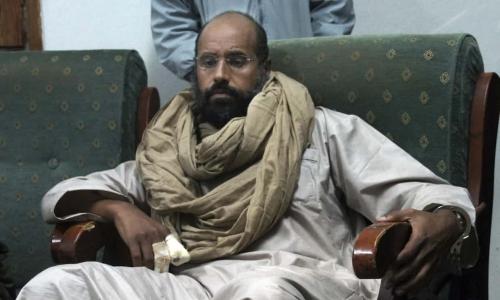government: operates under a transitional government
state of civil and political rights: Not free
constitution: the Transitional National Council, recognized by the UN in September 2011 as the legitimate interim government, operates under a temporary constitution
legal system: NA
legislative system: the UN in September 2011 recognized the Libyan Transitional National Council (TNC) as the legitimate governing authority for Libya until an interim government is in place; the TNC on 22 November 2011 established a new transitional government
judicial system: NA
religion: Sunni Muslim 97%, other 3%
death row:
year of last executions: 0-0-0
death sentences: 0
executions: 0
international treaties on human rights and the death penalty:International Covenant on Civil and Political Rights
1st Optional Protocol to the Covenant
Convention on the Rights of the Child
Convention Against Torture and Other Cruel, Inhuman or Degrading Treatment or Punishment
situation:
Under the penal code in force at the time of Gaddafi, dating back to 1953, there were 21 crimes punishable by death, including non-violent activities such as those relating to freedom of expression and association and other political offences and economic “crimes”.
Information concerning death sentences and executions were rarely reported.
In February 2011, an armed conflict started in Libya, following a series of peaceful protests that Colonel Muammar Gaddafi’s security services attempted to repress. After eight months of civil war and NATO air strikes, the armed conflict in Libya between forces loyal to Gaddafi and those seeking to oust his Government ended on 20 October 2011 with the capture and the murder of Gaddafi fleeing Sirte, his hometown.
Several videos related to his death were broadcast by news channels and circulated via the internet. The first shows footage of Gaddafi alive, his face and shirt bloodied, stumbling and being dragged toward an ambulance by armed men chanting “God is great” in Arabic. The second shows Gaddafi, stripped to the waist, suffering from an apparent gunshot wound to the head, and in a pool of blood, together with jubilant fighters firing automatic weapons in the air. A third video, posted on YouTube, shows fighters “hovering around his lifeless-looking body, posing for photographs and yanking his limp head up and down by the hair.”
On 23 October 2011, during his speech to the nation in Benghazi to formally declare the country’s liberation from the ousted regime, Libya’s transitional leader Mustafa Abdul-Jalil said that Sharia law would become the “main source” of legislation in the post- Gaddafi era. “Any law that runs contrary to the Islamic principles of the Islamic Sharia is legally void,” Mustafa Abdul Jalil said. Jalil, however, sought to reassure the international community by stating that Libyans were moderate Muslims and that the new Libya would not adopt any extremist ideology. He did not advocate cutting off the hands of thieves or stoning adulterers.
The country's central government appeared to be powerless in the face of a hodgepodge of tribal and city militias as well as Islamist factions that have come to the fore since the 2011 toppling of Libyan dictator Muammar Gaddafi.
Since the country’s liberation from Muammar Gaddafi’s regime in 2011, no information was available about judicial executions in Libya. The last known executions in Libya took place on 30 May 2010, when eighteen people, including nationals of Nigeria, Chad and Egypt, were executed for premeditated murder.
However, military and civil criminal courts in Misrata, Zawiyah, Benghazi, and Tripoli have issued dozens of death sentences. These include cases related to the 2011 conflict, as well as common criminal cases – mostly for murder.
On 12 April 2016, Saif al-Islam, second son of Libya’s former ruler Muammar Gaddafi, was released after he was captured in 2011 and sentenced to death by the Libyan government in Tripoli in 2015 for war crimes, his lawyer at the International Criminal Court (ICC), Karim Khan, told France 24 on 7 July. “Saif al-Islam was released under an amnesty and in accordance with (Libyan) law,” his lawyer added. The ICC had issued a warrant to try him in The Hague for crimes against humanity, but the Libyan government held on to him till their sentencing drawing widespread condemnation specifically directed at the credibilty of the divided country’s legal system. Karim Khan said he would file an application to make the ICC case inadmissible, arguing that his client has already been tried by his home country. “It is prohibited to try an individual twice for the same offense,” he said. Saif al-Islam, who was regarded as Gaddafi’s possible successor, has been kept in detention since 2011 by a militia in Zintan, north western Libya, that captured him.
Extra-judiciary executions by shooting were carried out in Libya in 2016 by the Islamic State (IS).
From mid-February 2015 to mid-February 2016, ISIS killed at least 49 people in the city of Sirte and outlying areas controlled by terrorists after largely secret proceedings that negate the most basic international fair-trial standards, Human Rights Watch (HRW) reported, adding that four of the executed were fighters from groups opposing IS, while 45 victims were accused of spying, sorcery and blasphemy.
The death penalty on women
Libya has ratified the International Covenant on Civil and Political Rights, the Protocol to the African Charter on Human and Peoples’ Rights on the Rights of Women in Africa, and the Arab Charter on Human Rights, which prohibit the execution of expectant mothers and of nursing mothers—but the exception provided for by domestic law may be more limited.
United Nations
On 13 May 2015, Libya was reviewed under the Universal Periodic Review of the UN Human Rights Council. In its national report, the Government said the Libyan legislature was striving to restrict the use of the death penalty and legal measures had been introduced to minimize its use, the most significant of which were the payment of blood money. The Government added that there was an ongoing debate between those who call for the abolition of the death penalty and those who argue that is necessary to maintain it because of the Sharia and in order to deter those who do not hold dear human life. In November 2015, in its response to the recommendations received, the Government did not support recommendations to establish a moratorium on the death penalty with a view to its abolition.
On 19 December 2016, Libya voted against the Resolution on a Moratorium on the Use of the Death Penalty at the UN General Assembly, as in the previous years.










